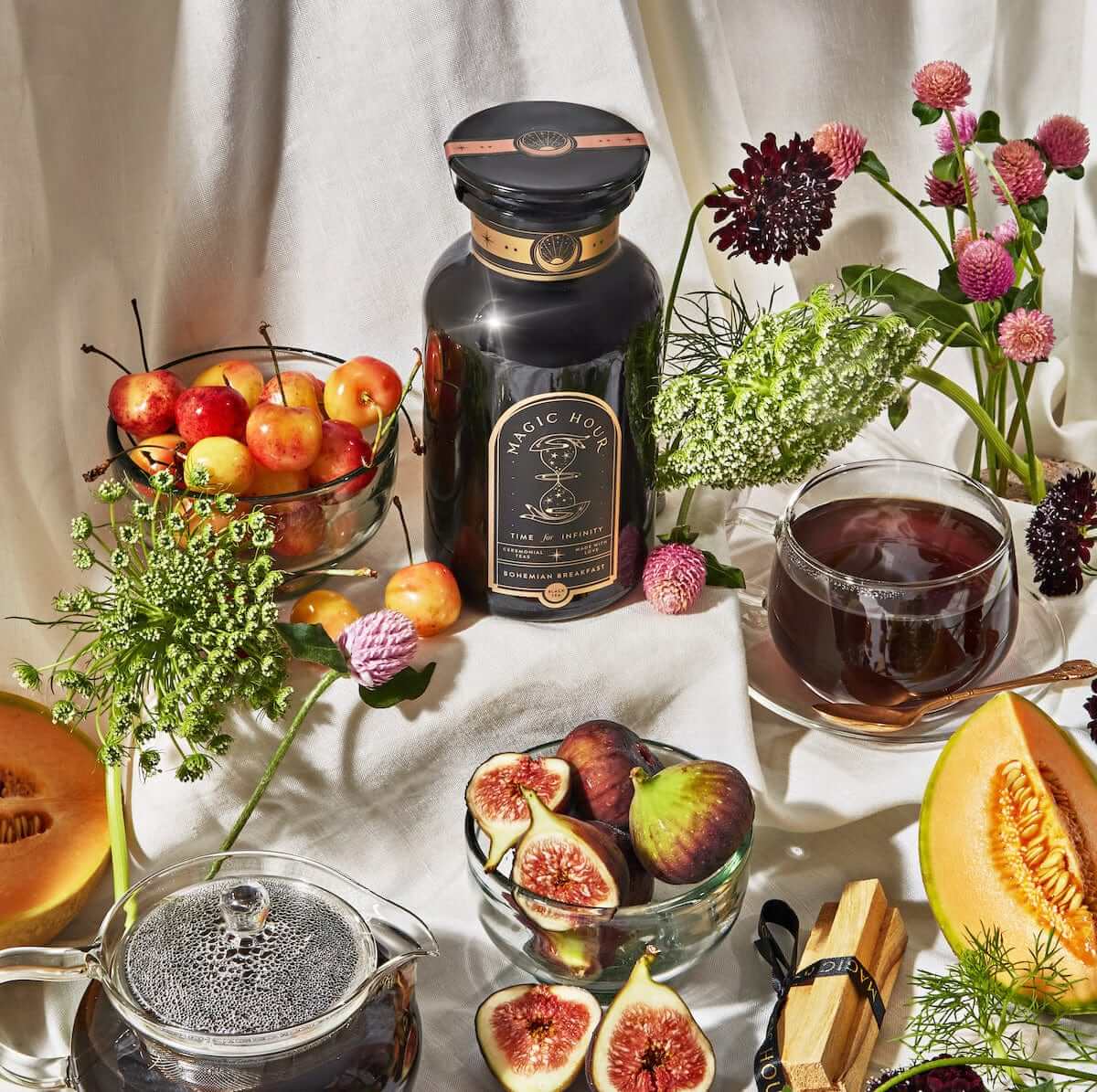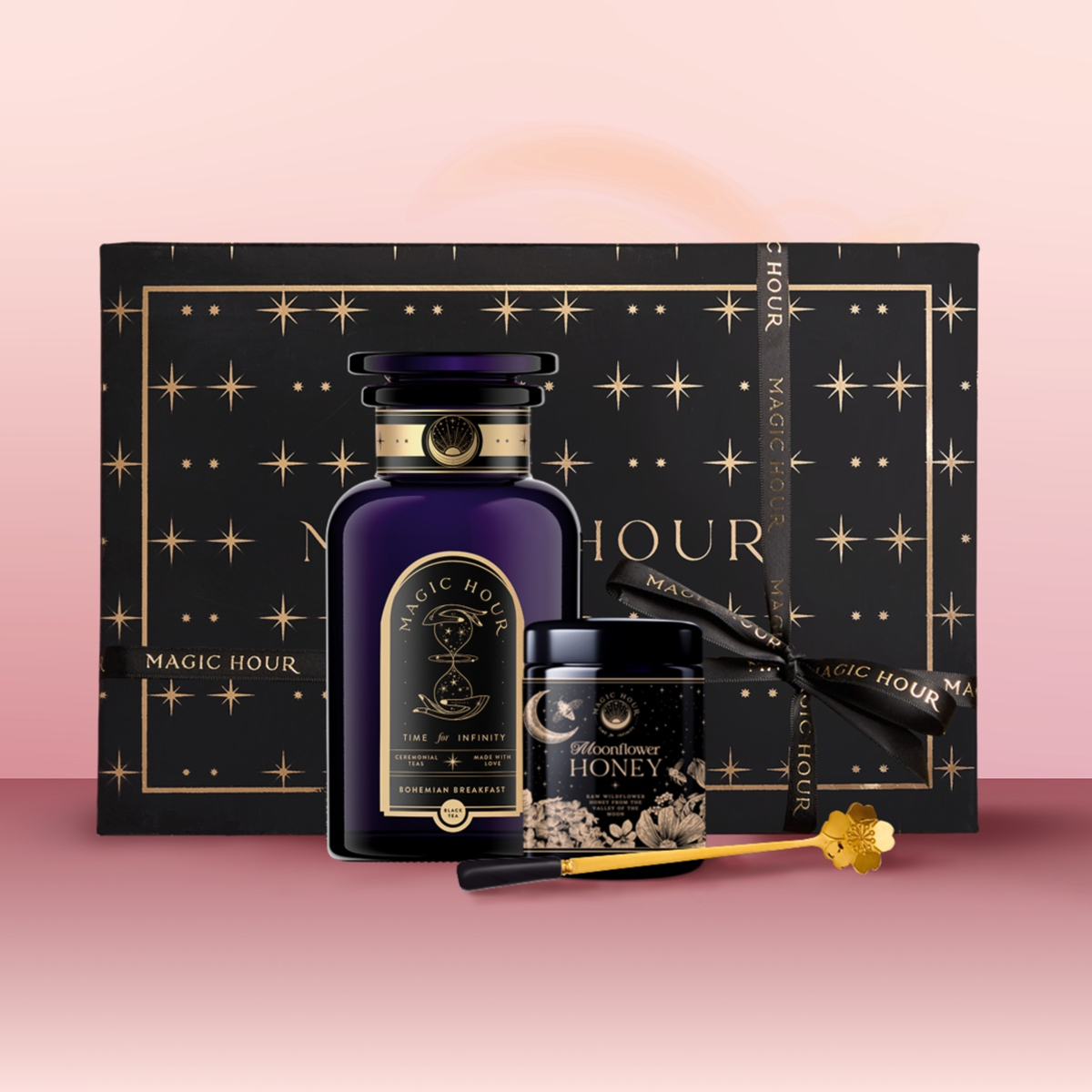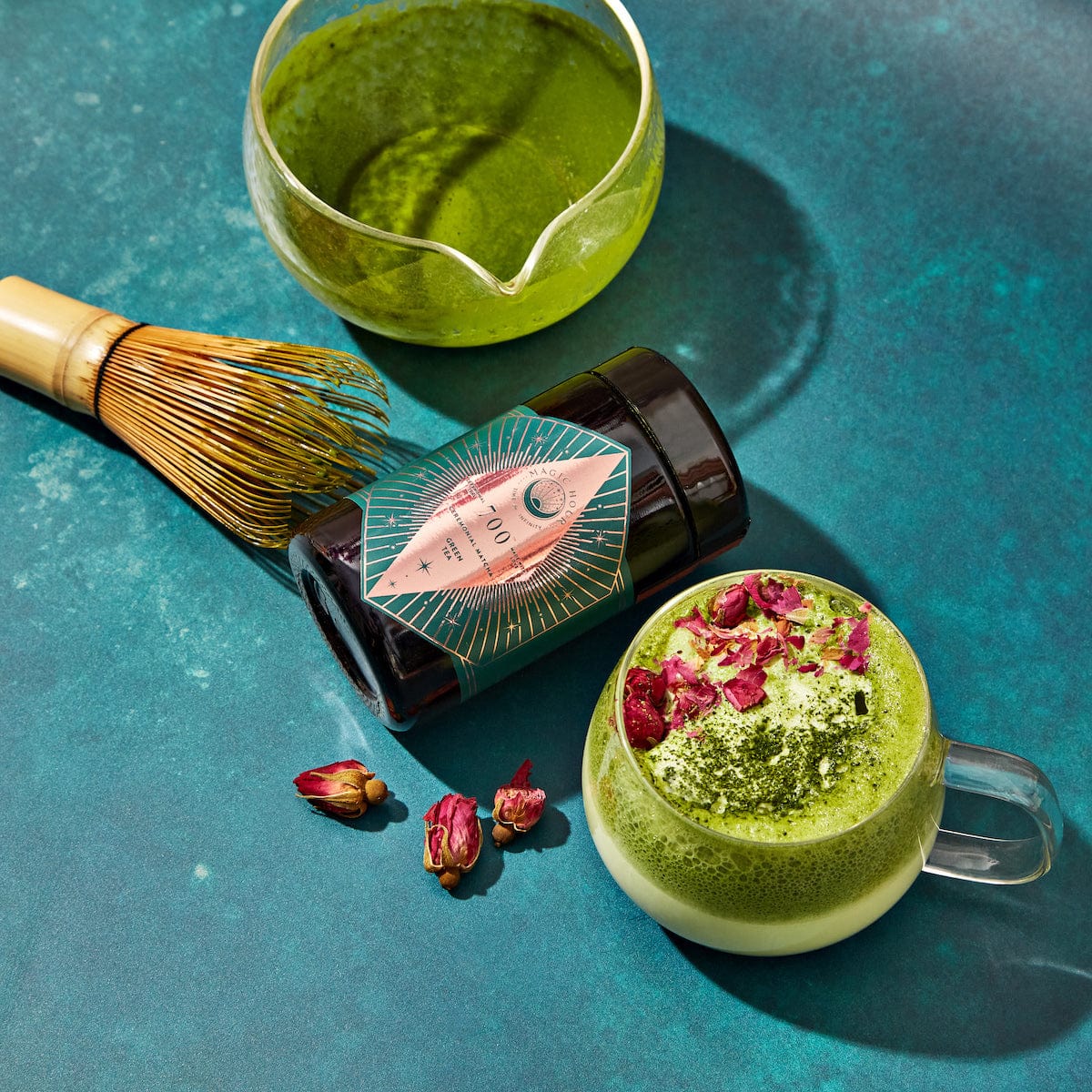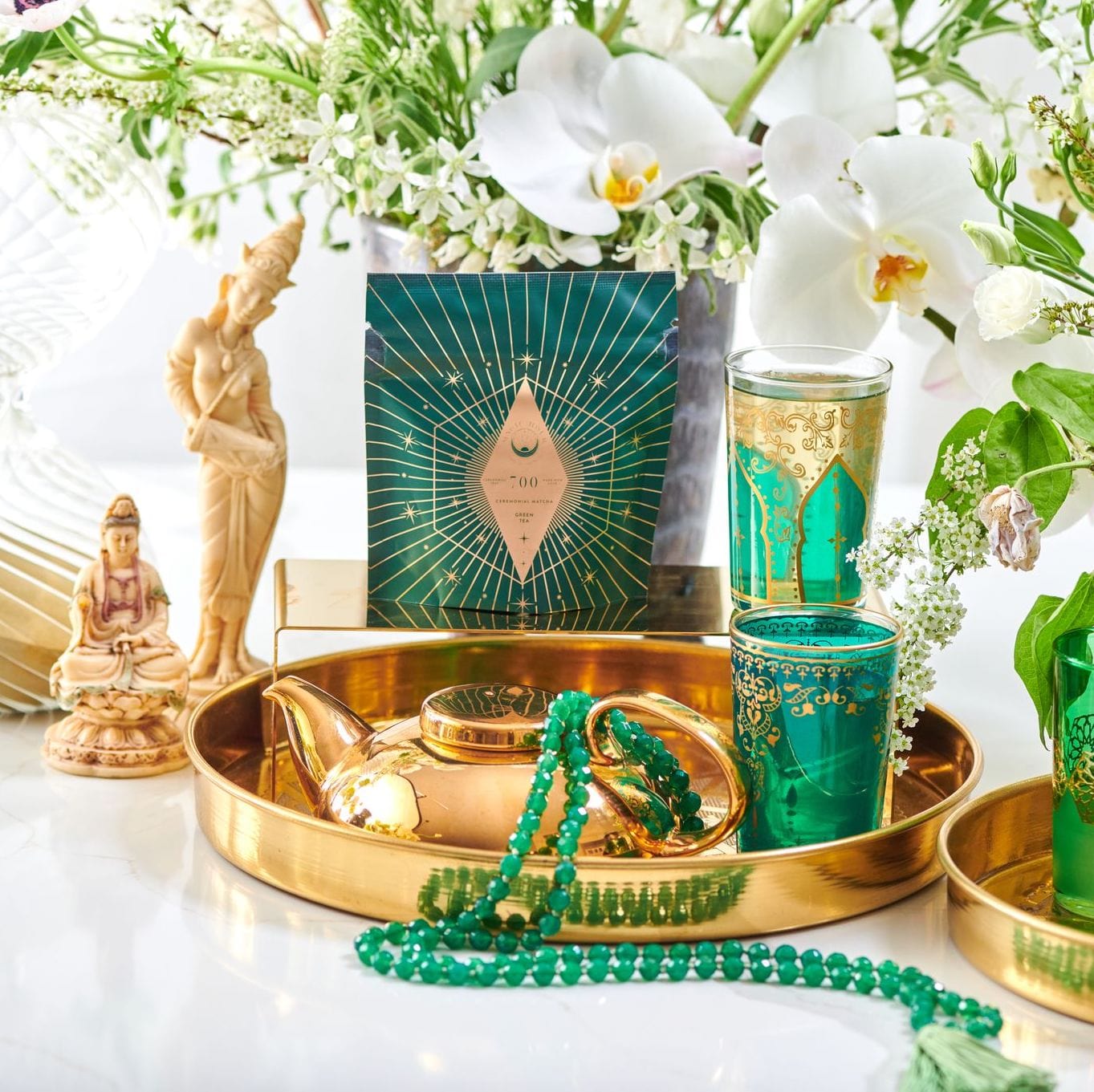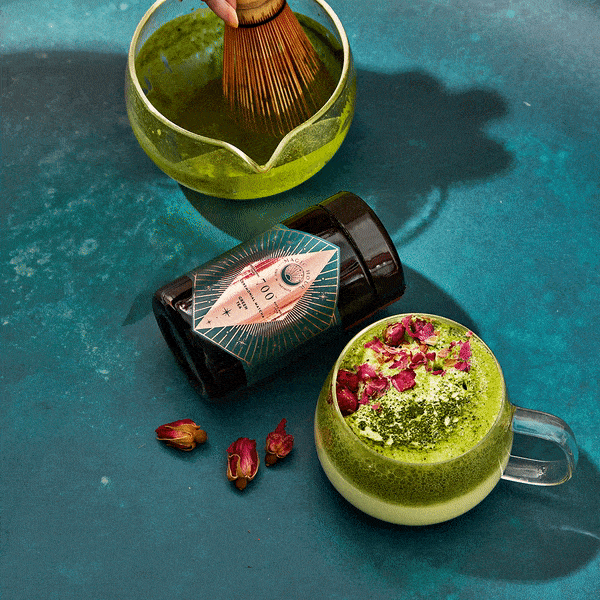If you love matcha, drinking it anytime seems like a great idea. As you whip out your bowl and powder and start madly whisking after dinner, you may stop and think, “Wait, can I drink matcha at night?”
Of course, technically, you can, but should you? Is there an ideal time of day to drink matcha?
This guide will explore what to expect when enjoying matcha at different times of day as well as the benefits and drawbacks of drinking matcha at night.
The Best Times to Drink Matcha
Regardless of caffeine sensitivity, some times of day are ideal for drinking matcha.
Drink Matcha in the Morning
For most people, the best time to consume matcha is shortly after waking up or just before going to work.
Matcha boosts energy and crystalizes focus. It pairs well with many breakfast options and gives you the energy to tackle the day. Here are our favorite matcha breakfast recipes to start your day.

Matcha is the ideal replacement for a morning cup of coffee because it’s healthier and contains less caffeine while still enjoying a cup of something hot and earthy.
Drink Matcha Before Working Out
A small amount of matcha before working out will give you the push you need to finish your workout strong. Matcha might also be the ideal pre-workout beverage for people who find exercising challenging after a long day at work or school.
For optimal effect, consume matcha 30 minutes to an hour before your workout. It will improve your focus, stamina, and endurance. Mix matcha with some high-protein soy milk to aid muscle rehabilitation.
Our organic, ceremonial-grade Organic Ceremonial Matcha 700: Ceremonial Matcha Tea of Longevity & Infinite Energy can help boost memory, attention, and cognitive functions and aid in weight loss.

Drink Matcha After a Meal
If you routinely go into a “food coma” after lunch or supper, try drinking a cup of matcha with your meal.
After a large meal, you could experience bloating and sleepiness. A little matcha might help.
However, it’s best to wait 30 to 45 minutes before consuming matcha. The tannins and caffeine in matcha are barriers during digestion, preventing the nutrients from being adequately absorbed.
Our Matcha 1111: Pinnacle Grade Ceremonial Matcha for Experiencing The Infinite is the finest quality Ceremonial Matcha, designated for exceptional occasions and for expanding the mind to the infinite.

Can I Drink Matcha At Night?
Okay, now we get right down to it.
Your question: “Can I drink matcha at night?”
Yes, you can.
But why would you want to?
Well, the same matcha benefits you get in the morning will still occur at night. Namely, the energy and focus boost you get from the caffeine.
This may be ideal for you if:
- You are in a profession that requires focus and energy at night
- You are a student needing to do late-night study
- You are a night owl
If this scenario is not ideal for you and focus and energy at night sound unpleasant, stick to drinking matcha in the morning or 6 hours before you plan to sleep.
Drinking matcha at night benefits those with different circadian rhythms or living on alternate schedules.
The Benefits of Drinking Matcha at Night
We’ve already covered the boost in energy and focus matcha gives at any time of day. Qatar University has published more of matcha’s incredible health benefits, including:
Relaxation — Matcha contains a robust amount of the amino acid L-theanine. L-theanine reduces stress and increases relaxation without causing drowsiness, so matcha is a terrific choice if you want to chill at night while remaining alert.
Increased Blood Flow — Matcha increases blood flow, especially to the brain, increasing memory and cognitive function. This may work great for you if you are up late cramming for an exam or memorizing a presentation.
Metabolic Health — Matcha improves metabolism and lipid profiles and balances blood glucose levels. This slows weight gain and helps regulate appetite.
Reduced Cancer Risk — The catechins in matcha are strong antioxidants. Antioxidants neutralize harmful molecules called free radicals. This boosts the cancer-fighting properties in your body.
Considerations for Drinking Matcha at Night
It’s great to reap the benefits of drinking matcha at night. But there are some other things you might want to consider before regularly indulging in the habit.
Caffeine Sensitivity
Caffeine sensitivity is the amount of caffeine a person can consume before feeling adverse effects.
Caffeine sensitivity is different for everybody. You probably already know how much caffeine you can tolerate as you have explored sodas, teas, and coffee throughout your life.
Caffeine blocks adenosine, a neurotransmitter that promotes sleep, leading to difficulty falling or staying asleep.
Some will have disrupted sleep from a single cup of coffee in the morning, while others can down a cup of joe an hour before bed and sleep soundly. What’s important is understanding your body’s response to caffeine and making your consumption choices accordingly.
Caffeine sensitivity can be further affected by:
- Alcohol consumption
- Medications
- Stress
- Diet
Other Health Conditions
In addition to overall caffeine sensitivity, some health conditions will affect how your body responds to caffeine.
Pregnancy: Pregnant people metabolize caffeine more slowly. This means its effects on the body last longer. High caffeine intake during pregnancy can cause increased risks of miscarriage and low birth weight, according to Lake Erie College of Osteopathic Medicine.
Therefore, many health guidelines, like the EFSA Panel on Dietetic Products, Nutrition, and Allergies, agree to limit caffeine intake to 200 mg daily during pregnancy. (This comes out to about 2 cups of coffee).
Anxiety Disorders: A study by Xuzhou Medical University confirms that caffeine stimulates the central nervous system and increases heart rate. This makes it difficult for those who have anxiety disorders to enjoy caffeinated beverages without growing more anxious.
Matcha is generally calming, but it also contains high doses of caffeine, so experiment with small amounts first if you suffer from anxiety.
Heart Conditions: For those with arrhythmias or hypertension, drinking caffeine can increase heart rate and blood pressure, per the University of Iowa. This can be uncomfortable and potentially dangerous.
Quality of the Matcha
In general, the higher the grade or type of matcha, the more caffeine it has.
This is because ceremonial grade matcha (the grade typically used for drinking) comes from the youngest and freshest leaves. The entire nutrient profile, including its caffeine content, locks into the tea leaves when steamed.

Culinary-grade matcha comes from later tea leaf harvests. It has less caffeine and a more bitter, astringent taste, so it’s best used in cooking to complement other flavors.
The caffeine content of your matcha is also influenced by the amount of powder you use when mixing it, how hot the water you use, and the freshness of your powder.
When to Avoid Drinking Matcha
Even if you love the taste of matcha, there are some times when you may want to cut back or avoid drinking it altogether.
Some of these times include:
If you need sleep: Unless you have a very high tolerance for caffeine, it’s not advisable to drink matcha when you need more sleep. If you just can’t resist, try drinking one cup in the morning and decaf beverages the rest of the day.
If you struggle with high blood pressure: Caffeine causes a temporary spike in blood pressure, as the University of Iowa confirmed. For most, this is not dangerous and is okay. However, if you already struggle to keep your blood pressure under control, drinking matcha could make it worse.
If you are breastfeeding: Like pregnancy, caffeine also affects the mother and baby's bodies while breastfeeding. Caffeine passes through the mother’s milk. So, it’s recommended by the Federal University of Pelotas not to exceed 300 mg/day of caffeine while breastfeeding.
Of course, none of this is medical advice. If matcha’s effects on your health concern you, ask your doctor how much is safe for you to consume.
How to Make Matcha
Making matcha is as simple or complex as you’d like.
Those who drink it with an understanding of its deep cultural and ceremonial roots will have a more meditative practice.
Others may whisk up their favorite blueberry matcha latte and go.
However you enjoy your matcha, our website has a library of easy and delicious tea recipes.
(Watch one of our favorites below).
Here is a basic go-to recipe for a standard cup of ceremonial-grade matcha.
Use a bamboo whisk (chasen), a bamboo scoop (chashaku), a matcha bowl (chawan), and a fine sieve.
(Our ceremonial matcha gift set pictured below includes everything you need to get started).

Heat water to 160-175°F (70-80°C). Do not use boiling water. It can scorch the matcha, resulting in a bitter taste.
Use the fine sieve to sift 1-2 bamboo scoops (about 1-2 grams) of matcha into the bowl. This ensures no clumps form in your matcha powder.
Next, pour 2-3 ounces of hot water into the bowl.
Use the bamboo whisk to briskly whisk the matcha in an “M” or “W” motion until a frothy layer forms on the surface.
Add more water to taste. Serve immediately.
Get Matcha at Magic Hour
So, to answer your question, “Can I drink matcha at night?” Yes, you certainly can! However, you should consider your personal caffeine sensitivity and any possible drawbacks if you enjoy matcha later in the evening.
Our pure and pristine matcha tea options offer many advantages, such as brain health and cognitive function, long-lasting energy, and increased metabolism.
You may also enjoy our White Tea and Oolong Tea collections. New to Magic Hour? Try our Tea Quiz to find the perfect tea for you.
FAQ
Is it good to drink matcha before bed?
Matcha has a calming effect on many people but also has a lot of caffeine. If you are sensitive to caffeine or want a good night’s sleep, you shouldn’t drink matcha before bed.
What time is too late to drink matcha?
Your caffeine sensitivity also comes into play here. But generally, caffeine stays in your system for up to 10 hours and causes sleep disruption for 6 hours, so plan your matcha drinking accordingly.
Is matcha better than coffee at night?
Matcha has less caffeine than a cup of coffee. But still more caffeine than a cup of black tea. If you are sensitive to caffeine, drinking matcha or coffee at night will likely disrupt your sleep.
Is matcha good after a night of drinking?
Matcha can be soothing, but on an empty stomach, it produces excess acids that can be uncomfortable. To maximize its therapeutic properties, we recommend drinking it with a light breakfast, like buttered toast.

